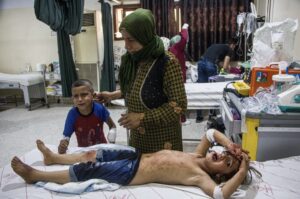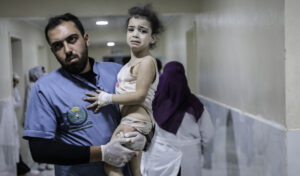After months of despair, there is a glimmer of hope for cancer patients in north-west Syria as cross-border treatment has resumed in Turkey. The region had been devastated by an earthquake earlier this year, leaving many without access to life-saving radiotherapy. However, despite the resumption of treatment, a significant backlog exists, placing numerous patients in a state of limbo and potentially jeopardizing their lives.
Sanjana Quazi, the head of the UN humanitarian affairs agency (Ocha) in Turkey, expressed gratitude towards the Turkish government for allowing cross-border referrals to Turkish hospitals. The referrals, which officially resumed this week through the Bab al-Hawa border crossing, have already reached 80 cases, including both new and old patients. Quazi emphasized the life-saving potential of this resumption of services, acknowledging that it will undoubtedly save lives.
The situation for cancer patients in north-west Syria has been dire even before the earthquake hit. Relief International (RI) and the Syrian American Medical Society (Sams) have shed light on the deteriorating conditions in the area through a joint report published in May. The report revealed that up to 3,000 new cases of cancer are diagnosed each year in the region, yet it is serviced by only three oncologists, leaving the population of 4.1 million with limited access to adequate care.
The prevailing extreme poverty and Syria’s crippled healthcare system have made survival the primary focus for most individuals, resulting in delayed checkups and advanced-stage diagnoses. While some NGOs offer surgical interventions, radiotherapy has been inaccessible.
One of the significant hurdles faced by patients is the cost of travel for follow-up assessments in Turkey. Many cannot afford the expenses, preventing them from receiving the necessary healthcare. the importance of providing free healthcare and cancer treatment within north-west Syria to ensure that patients can access the care they desperately need.
another issue plaguing the region—the scarcity of drugs. Criminals have exploited this situation by selling counterfeit medications, taking advantage of desperate patients in urgent need of legitimate treatment. The lack of effective supervision over imported drugs in a war zone has allowed fake oncology medicines to proliferate on the black market, exacerbating the crisis further.
The war in Syria has devastated the healthcare system, with half of all health facilities destroyed or damaged and a significant exodus of specialized medical personnel. Only 35 oncologists remain in the country, making the situation even more dire for cancer patients. The report also revealed that Syrians have resorted to negative coping mechanisms, such as smoking and substance abuse, further increasing the risk of developing cancer.


